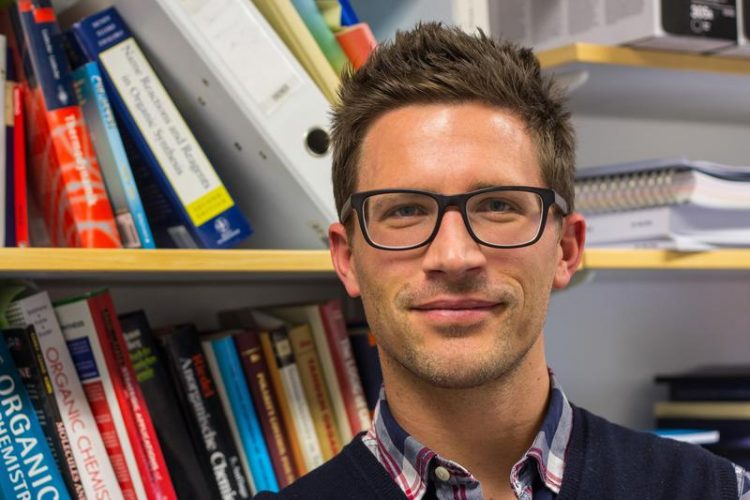Fighting germs with replicas of natural compounds

Thomas Magauer Cedric Hugelshofer
Due to the widespread use of antibiotics, pathogens are becoming increasingly resistant to common antibiotics. Since the discovery of penicillin, antibiotics have revolutionized the therapy of bacterial diseases, but these medical weapons could soon become ineffective. This is why scientists have been looking for new active substances for years.
Thomas Magauer from the Department of Organic Chemistry at the University of Innsbruck focuses on natural substances for which there is already evidence of a possible effect against bacteria. He synthesizes these molecules in the laboratory and optimizes their effects by artificial adjustments. In a recent study in Nature Communications, Magauer's research group presents a modular approach to the chemical synthesis of an entire group of natural substances that are said to have antibacterial, antiviral and anticancer properties.
Despite their similarity, there have been only a few attempts to synthesize and investigate these natural products. “With the new approach, a platform is now available to investigate this fascinating family of natural products in more detail”, says Thomas Magauer, who is full professor of organic chemistry at the University of Innsbruck.
Effect against MRSA germs
So far, these substances have been extracted from fungal or marine sources. However, it is often not possible to obtain the necessary quantities. Using this novel synthetic platform, six of these natural substances and 15 artificial molecules derived from them can be produced in just a few steps. Together with the research group led by Mark Brönstrup at the Helmholtz Centre for Infection Research in Braunschweig, the researchers also investigated the biological effects of the molecules.
For gram-positive bacteria, a very good biological activity of some of these molecules could be demonstrated. Two of the molecules, Strongylin A and one fully synthetic derivative, possess significant antibiotic activity against MRSA. These multi-resistant germs from the group of Staphylococci play an important role in hospitals and nursing homes as the cause of infections. MRSA variants are now also found in the normal environment.
“By implementing additional modifications to the artificially produced molecules, their effect should be further enhanced in the future,” says Thomas Magauer. His research is financially supported by the European Research Council ERC and the German Research Foundation DFG.
Publication: A modular synthesis of tetracyclic meroterpenoid antibiotics. Raphael Wildermuth, Klaus Speck, Franz-Lucas Haut, Peter Mayer, Bianka Karge, Mark Brönstrup, and Thomas Magauer. Nature Communications 8: 2083 DOI: 10.1038/s41467-017-02061-7
Contact:
Thomas Magauer
Department of Organic Chemistry
University of Innsbruck
phone: +43 512 507 57731
email: thomas.magauer@uibk.ac.at
Christian Flatz
Public Relations
University of Innsbruck
phone: +43 512 507 32022
email: christian.flatz@uibk.ac.at
http://dx.doi.org/10.1038/s41467-017-02061-7 – A modular synthesis of tetracyclic meroterpenoid antibiotics. Raphael Wildermuth, Klaus Speck, Franz-Lucas Haut, Peter Mayer, Bianka Karge, Mark Brönstrup, and Thomas Magauer. Nature Communications 8: 2083
http://www.uibk.ac.at/organic/magauer/ – Research Group Thomas Magauer
http://www.helmholtz-hzi.de – Helmholtz Centre for Infection Research
Media Contact
All latest news from the category: Life Sciences and Chemistry
Articles and reports from the Life Sciences and chemistry area deal with applied and basic research into modern biology, chemistry and human medicine.
Valuable information can be found on a range of life sciences fields including bacteriology, biochemistry, bionics, bioinformatics, biophysics, biotechnology, genetics, geobotany, human biology, marine biology, microbiology, molecular biology, cellular biology, zoology, bioinorganic chemistry, microchemistry and environmental chemistry.
Newest articles

Properties of new materials for microchips
… can now be measured well. Reseachers of Delft University of Technology demonstrated measuring performance properties of ultrathin silicon membranes. Making ever smaller and more powerful chips requires new ultrathin…

Floating solar’s potential
… to support sustainable development by addressing climate, water, and energy goals holistically. A new study published this week in Nature Energy raises the potential for floating solar photovoltaics (FPV)…

Skyrmions move at record speeds
… a step towards the computing of the future. An international research team led by scientists from the CNRS1 has discovered that the magnetic nanobubbles2 known as skyrmions can be…





















